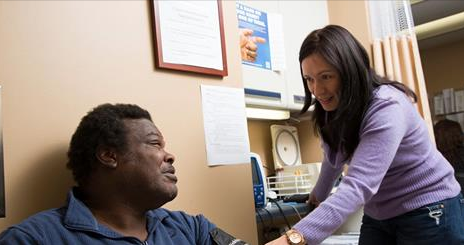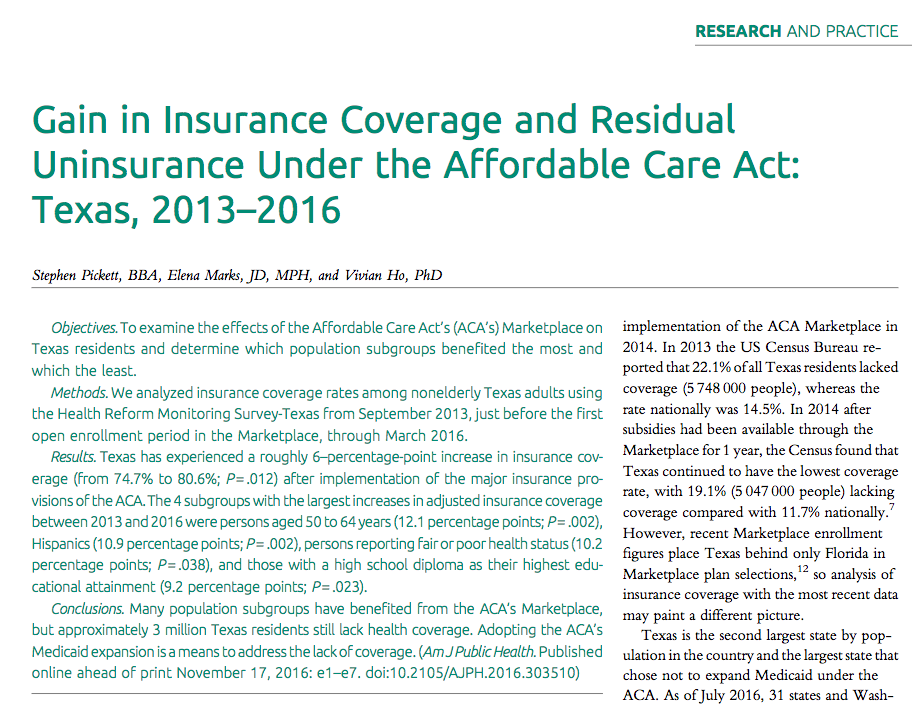
Texas has experienced a roughly 6 percentage-point increase in health insurance coverage from the Affordable Care Act (ACA), according to new research by experts at EHF and Rice University’s Baker Institute for Public Policy.
This translates into just under 1 million Texans who have gained coverage due to President Barack Obama’s health care law. The new findings published in the American Journal of Public Health examined the effects of the ACA’s Marketplace on Texas residents and determined which population subgroups benefited the most and the least.
“The recent criticism of the program’s high premiums for next year ignores the benefits the legislation has provided to many Texans and the fact that policymakers are now identifying options to slow that premium growth,” said research co-author Vivian Ho, the chair in health economics at Rice’s Baker Institute for Public Policy and director of the institute’s Center for Health and Biosciences.
Click here for the full article in the American Journal of Public Health
The researchers analyzed insurance coverage rates among nonelderly Texas adults using the Health Reform Monitoring Survey-Texas from September 2013, just before the first open-enrollment period in the marketplace, through March 2016. They found that gains have been uneven and that the four subgroups with the largest increases in adjusted insurance coverage between 2013 and 2016 were people ages 50 to 64 years (12.1 percentage points), Hispanics (10.9 percentage points), people reporting fair or poor health status (10.2 percentage points) and those with a high school diploma as their highest educational attainment (9.2 percentage points).
“Even with these gains, 3 million Texans between the ages of 19 and 64 remain uninsured,” said co-author Elena Marks, EHF’s president and CEO and a nonresident health policy fellow at the Baker Institute. “An estimated 766,000 of these would likely have gained coverage if Texas had elected the Medicaid expansion offered under the ACA.”
President-elect Donald Trump and congressional Republicans have announced their intent to repeal Obamacare.
“Moving quickly to repeal the law would jeopardize the policies of the 1 million Texans who have already gained coverage, and would do nothing for the 3 million who are still uninsured,” Ho said. “The ACA was designed to be budget neutral for the federal government — subsidies for people to buy coverage were covered by taxes on insurance companies, medical device makers and others, as well as lower increases in reimbursement rates for Medicare providers. A Republican alternative that is equally successful in covering so many individuals will require careful thought on how this coverage can be paid for without adding to the federal debt.”
On the federal level, policymakers should focus on reining in price growth from drug manufacturers, as well as physicians and hospitals, Ho said.
“At the state level, Texas may have an improved chance at obtaining an extension on its Medicaid waiver beyond 2017 that will allow it to continue receiving federal dollars to provide health care for the poor, without a formal link to President Barack Obama’s Medicaid expansion,” she said. “This approach is likely economically inefficient, but politically expedient to those in office.”
“Gain in Insurance Coverage and Residual Uninsurance Under the Affordable Care Act: Texas, 2013-2016” was also co-authored by Stephen Pickett, a doctoral student in Rice’s Economics Department.
